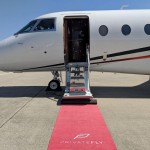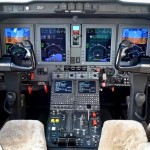Streamlining the security process
Streamlining security screening for private jet passengers, while maintaining impeccable private jet safety levels, is an ongoing area of development for the private jet industry. Of course, even private jet passengers must undergo security checks, many are reassured by this part of the departure process (though would of course want it to be as rapid as possible).
At PrivateFly we are able to pre-screen private jet passengers. The operator of the flight undertakes full security and passport checks prior to the passenger’s arrival at the airport. This is then usually followed by a further, quick ID and baggage check before boarding, which means that the passengers are able to move through the FBO very quickly once they arrive – without the security delays so often experienced at main airport terminals. Depending on the country, these final checks can often be undertaken by the staff of the FBO or handling agent.
However there is increasing pressure from agencies, including the UK Border Agency (UKBA), to implement a consistent security process for private jet flights which is more in line with commercial airline flights. This could mean checks undertaken at the point of departure – particularly in the run up to high profile events such as the London 2012 Olympics.
Of course this presents practical and economic problems for the average FBO. It would be expensive to hire full-time security staff for the relatively small passenger throughput of a private jet terminal – compared to the huge flow of passengers moving through a commercial airport terminal. And there would be unwelcome delays if the passengers had to wait for the security officers from the main airport to arrive.

Recently Signature Flight Support at London Luton airport has invested in new technology for security screening. This is a video link system which allows security staff to remotely check and clear passengers and their baggage at the point of departure, using the latest technology to perform high-quality visual ID, security and passport checks.
Signature have been testing this for some time now and it appears to be quick and seamless – it’s not offputting to passengers, while providing a more economical staffing solution.
It will be interesting to see if other private jet FBOs follow suit – and indeed other main airport terminals could also consider using this technology, particularly as a back-up system when experiencing peak demand or for smaller airports where the staffing balance is more difficult to achieve.
The private jet industry often proves to be a test bed for innovation in aviation and this is another advancement which may well become adopted as best practice in the industry at large.
Related content

Three special ‘Leap Day’ trips by private jet

How our safety & service standards are evolving under OneSky



